Sarah Ockler's Blog, page 4
August 24, 2011
Dear Missouri: See You During Banned Books Week!
It's official… I'm going to the Show-Me state!
I'm so excited to announce that I'll be traveling to Springfield, MO to participate in Banned Books Week events with the Springfield-Greene County Library District September 30 and October 1! The parents, students, teachers, and librarians of Republic and the surrounding areas have been so wonderfully supportive during the year-long challenge and eventual ban of Twenty Boy Summer and Slaughterhouse Five. It's an honor for me to visit and meet readers in person. A huge thank you to the Springfield-Greene County Library District for making this possible.
Update! Here is the complete schedule of events:
Friday, September 30 :: 7:00 PM
Author talk and book signing
The Library Center
4653 South Campbell
Springfield, Missouri 65810-1723
Saturday, October 1 :: 12:00 PM
Read-out!
The Library Station
2535 North Kansas Expressway
Springfield, Missouri 65803-1184
Saturday, October 1 :: 4:00 PM
Read-out!
The Library Center
4653 South Campbell
Springfield, Missouri 65810-1723
Saturday, October 1 :: 5:00 PM
Banned books discussion panel
The Library Center
4653 South Campbell
Springfield, Missouri 65810-1723
Missouri friends, I look forward to seeing you all next month!
Filed under: books, reading








August 22, 2011
How To Query Lit Agents: 6 Overlooked Steps
For novelists, the path to publication often feels like throwing a bunch of goop at the wall (spaghetti noodles? Gak? Caramel sauce? You decide!) and seeing what sticks. Individual agent and publisher tastes, industry trends, economic doom-and-gloom, luck, timing, fairy dust, even whether an agent got decaf instead of regular from the coffee cart guy just before opening your email — all of these invisible forces can influence an author's ability to snag an agent.
But for every random twist of fate, there are plenty of forces writers can control — concrete steps to ensure the novel has the absolute best shot at find an agent home and ultimately, a place on the shelves.
The search for the right literary agent should be targeted, informed, and methodical. While most writers are familiar with the basics, in those exciting first weeks on the adventurous path to publication, many overlook the details. Details may seem overwhelming, but when it comes to finding the best home for your work and the launch of your writing career, a little extra time and care are worthwhile investments. Don't shortcut!
6 Steps to Querying Literary Agents
1) Finish your novel.
This one seems obvious, right? You can't query something that doesn't exist. Yet, people do. Eager writers looking to get a jumpstart on what may be a long process reason that if they query early, by the time they get a request for material, the currently unfinished manuscript will be ready. Or, better still, their idea is so amazing that agents will make an offer on concept alone.
The truth is that querying unfinished novels wastes time. If an agent shows interest immediately, at best, you're scrambling to finish, turning in something rushed and unpolished that will ultimately get rejected. At worst, you don't finish, and then you're forced to respond with an awkward apology, potentially blacklisting yourself from his future consideration.
So, before you send out that first query, complete your novel. And "complete" does not mean the moment you type "the end." It means that your novel has been reviewed by other trusted writers, revised (probably multiple times), and polished until it's the absolute best thing you have ever written (at least, for now!).
An exception: If you have an opportunity to chat with an agent about your novel-in-progress — say, at a party or a literary conference where you've paid for a critique or the event is set up specifically for you to meet agents — by all means, talk about your book. It's never the wrong time for agent feedback in these settings, and even if your story is still in draft mode, you may benefit from an agent's thoughts on your idea. Regardless, if an agent shows interest, this doesn't mean you rush home, slap together the last few chapters, and send it off to your new agent bestie. It means that you thank the agent, let her know where you are in the process, and then, when you're ready to query, you remind her of your meeting and her initial interest in your letter. Making a connection (and a good, professional impression) now is a great way to reintroduce yourself later.
2) Familiarize yourself with the querying and publication process.
I know you're anxious to get your completed novel out there, but a little preparation will save you anguish and anxiety later. Take a few days to learn about the industry and in general, how the querying process works. Take notes on potential questions you can ask an agent once you receive an offer. Try to prepare yourself for the potential wait and for next steps.
There are lots of great resources out there on queries, synopses, and general information on how publishing and book contracts work, including:
THE SELL YOUR NOVEL TOOL KIT by Elizabeth Lyon. From Google Books: Lyon offers novelists the wisdom of her experience as an author, book editor, writing instructor, and marketing consultant. Step-by-step, she details what editors want, what questions to ask them, and how to develop a marketing strategy.
GIVE 'EM WHAT THEY WANT: THE RIGHT WAY TO PITCH YOUR NOVEL TO EDITORS AND AGENTS by Blythe Cameson & Marshall Cook. From Google Books: An overview of the entire publishing process, this book is a must-have for any fiction writer.
AgentQuery. AgentQuery claims to be the largest, most current searchable database of literary agents on the web. It's free, and it also includes articles and tips on querying, the publishing industry, and guidance for new authors.
Pub Rants. Agent Kristen Nelson blogs about the agenting and publishing business with topics like book contracts, pitch sessions, industry trends, queries, and tons of interesting info for authors. Check out her Agenting 101 and Queries series' (linked in the blog's lower right sidebar) especially.
Nathan Bransford's blog. Nathan is a former lit agent turned author and tech industry guy. His site contains a trove of publishing tips and industry info, and he still blogs regularly.
Miss Snark. Miss Snark no longer blogs, but her archives — not for the easily discouraged! — are worth a perusal.
If anyone has other resource suggestions, let me know in the comments below and I'll update the list accordingly.
3) Develop a list of targeted agents.
Once you have a handle on the process, start putting together a list of agents for your query campaign. Be sure that the agents you're targeting represent your genre, are currently accepting submissions, and would be — to the best of your knowledge — a good fit for you and your project. Remember, this isn't a generic email blast. Targeting is key.
I used Publishers Marketplace and AgentQuery to research agents. QueryTracker is another one. These are informational Web sites that list agents, genres, clients, recent sales, and contact preferences. QueryTracker also lets you set up an account to organize and manage your search through their website. Writer's Market is a subscription-based service that contains information on agents along with agency terms and recent sales.
Once you've identified potential agents, Google them by name, too. Check out blogs where they're mentioned or websites from their current clients to get a better feel for how the agents work. For example, if you prefer an agent who offers a lot of editorial guidance and new project direction, but one of the agents on your list turns out to be primarly focused on contract negotiations, you might want to reconsider querying him.
Some writers divide their list into top ten, tier two, and tier three so they can query in batches. This can be helpful if you're looking to test the waters, make adjustments to your letter, and send out a new batch. How you approach the list is up to you. The important thing is that you do your homework!
4) Write a kickass query letter.
Yeah, the really hard part. There are lots of sample letters in the resources I mentioned (and you should definitely check them out), but here are the basic components of a good query letter:
Address the query to the agent by name
Title, word count, and genre of your manuscript (e.g., "I'm seeking representation for my 60,000-word middle grade fantasy novel, Wizards Who Live Under the Stairs.")
You may want to include a sentence on how you found that agent and/or why you think he or she would be interested in your work. "As a regular Pub Rants reader, I know that you represent young adult authors and thought you might consider reviewing my 50,000-word young adult novel, Awkward First Kisses at Parties, or "I enjoyed your client John Smith's Pioneer Girlfriend and thought my YA time travel romance might also resonate with you."
THE MOST IMPORTANT PART: A short, exciting summary of your novel (a paragraph or two) that gives a glimpse of the main character and the primary conflict. Don't give away the ending or over-inflate the premise — you want just enough to make the agent say, "Whoa, I want to know what happens to this guy! Send me more!" This is the most challenging part of the letter, because unlike the creative writing talent you harnessed to write your novel, a query letter is pure sales and marketing. If you're stuck on how to summarize your story in an exciting and sales-y way, check out the jacket copy on books similar to yours. Jacket copy is designed to capture a reader's attention and get her to read on, which is exactly your goal with an agent.
You may want to draw comparisons to other novels or well-known movies ("Readers who enjoy J.K. Rowling's Harry Potter series will appreciate the magical twists and turns and lovable underdog in When Good Wizards Go Bad"), but this can be tricky. Done well, a comparison can give agents an idea of your intended audience and can show that you've already started thinking about marketing. But you also run the risk of confusing the agent with awkward comparisons ("My Friend Jenny is If I Stay meets Hunger Games…") or false and overconfident promises ("My novel Vampy, Campy, and Trampy is sure to be the next Twilight!"). It's a tough balance, but if you have a natural and compelling comparison in mind, go for it.
Your writing bio (the honest version) and related experience. Don't lie or exaggerate publishing credits. Include only relevant credits (e.g., if you're writing a YA werewolf story, you don't need to mention your masters thesis on the theory of relativity), important contest wins, and any work or personal experience related to the subject of your novel (e.g. "After living on a farm for six months without modern amenities for a class project, I was inspired to write about the experiences of pioneer teens.") If you have a current and well-trafficked blog related to writing or to your subject matter, mention it. Avoid self-aggrandizing or meaningless endorsements like, "My mom and all of her Scrabble club friends said it was the best book they'd ever read." If you're not published, that's fine. There are lots of debut authors out there, and plenty of agents who love working with them.
A professional, non-aggressive closing. "If this project intrigues you, I would be happy to send the manuscript for your review. Thank you for your time and consideration, Mr. Smith. Sincerely, Sally Jones"
Your contact information (phone number and email address)
The query letter should be no longer than a single page.
Once you've written your letter, let it cool off a bit before sending. With fresh eyes, take another look to ensure it's succinct, compelling, and totally error-free. Show the letter to some trusted friends — another set of eyes can't hurt!
5) Launch Your Query Campaign
With your compelling letter and targeted list in hand, it's time to start querying. While the body of your query — the exciting stuff about your book — will remain the same, your letter should be personalized to each agent and submitted per his or her individual submission guidelines. That means no "Dear Agent," "To Whom It May Concern," "Dear Sir or Madame," and certainly no cheeky "Dear Future Representative of The Next Great American Novel." Most agents accept electronic queries, but some request them via email and others use forms on their website. Follow those submission guidelines carefully! Some agents want just a query letter, others want a letter and the first 5-10 pages of your manuscript, others want a synopsis. They're all different, and many agents won't even open submissions that don't adhere to the guidelines.
6) Assess, Regroup, Retry
Responses to your query campaign will generally come in one of three forms:
Requests. You may receive requests for a partial or full, meaning an agent was intrigued by your letter and would like to review part or all of your manuscript. This is a good thing! Respond promptly with the requested material.
Rejections. If you get rejections, resist the urge to reply and tell the agent he's a moron or that he's missing out on the next J.K. Rowling. Be nice, and be professional. Either don't respond at all, or just send a quick email thanking him for his consideration and wishing him well on future projects.
Crickets. Most agents have at least a form rejection, but it's normal to not hear back for a few weeks or even months. Resist the urge to re-query or check in unless the agent suggests doing so on her website or submission guidelines.
If you're not getting requests for your manuscript, take another look at your query letter. While it may be your novel itself, or timing in the industry, or any number of those random uncontrollable things we talked about earlier, it may just be that the letter isn't doing its job in selling the concept of your novel. Since this is the shortest fix and easiest to test, give it a rewrite and try again.
If agents request your partial or full manuscript but ultimately decline representation, or if you've re-written your letter and you're still not getting requests, then it may be time to take another look at your novel. If you're fortunate enough to receive specific feedback on why the agent passed, take a look at it and see if it resonates with you (especially if you've received the same type of feedback from more than one agent). Yes, publishing a subjective business, but if five agents say "I loved the concept, but your opening is bogged down with too much backstory," or "The main character comes off as cold and unsympathetic," pay attention and consider revising.
Lather, rinse, repeat. Some authors find an agent on the first try. Others query hundreds before finding the right match. It's hard to be patient, but use the time to work on a new project or take some time off from writing altogether. Go outside. Smell the roses and stuff.
(Seriously? Don't listen to me. I got myself so worked up during the waiting period I called in sick to work and got up close and personal with Ben and Jerry as I manically refreshed my email every nineteen seconds. Not healthy, but true!)
An Offer? An Actual Offer?
If after requesting your manuscript an agent makes an offer (or even if she simply wants to chat further by phone), congratulations! That means you're ready for the next set of important steps: Literary Agent Offers: Don't Settle!
Until then, happy writing, and best of luck on your agent search!
Got questions? Let me know in the comments and I'll answer in a follow-up post.
Filed under: Book Publishing 101, publishing Tagged: agent queries, agents, finding a literary agent, literary agents, query letters, querying literary agents, writing a query letter








August 16, 2011
"Moral Standards" Protect Students Against Books, But Not Rape
This is so disgusting, disheartening, despicable, and a god damn outrage that I can't even say much more about it at the moment. Just read the articles below. And yes, it is the same school district that attempted to ban Speak, a story about a girl who struggles to find her voice after she's raped by a fellow student, and successfully banned Twenty Boy Summer and Slaughterhouse Five based on "standards for age appropriateness." To quote superintendent Vern Minor on why he supported the ban: "I don't think [the book is] consistent with these standards and the kind of message that we want to send."
So just what kind of message do we want to send students in the Republic school district, Mr. Minor? This kind? School Reportedly Made Girl Write Apology To Her Alleged Attacker? This kind? Lawsuit filed against Republic School District over rape claim?
Seriously! WTF?!?!?
Filed under: writing








August 5, 2011
Books That Win: Put *These* On Your TBR Stack & Smoke 'Em!
When I was a kid, my dad spent countless hours teaching me how to play two games: Backgammon and Pente. Eventually I reached a certain awareness and skill level and no longer expected him to simply let me win, and he started playing for real. Whenever he'd make a winning move, which was basically every time we played because I was, like, 8 years old and not yet privy to the wily ways of the world, he'd set down his piece emphatically and say, "Put that in your pipe and smoke it." I had no idea what he meant, but from then on, I dedicated my young life to perfecting my board game strategy so that one day, I could co-opt the winning phrase.
By now you're like, "Okay, Sarah, that's a really cute story about the roots of your extreme board game competitiveness which by the way is the sole reason Pet Monster refused to play Monopoly with you for ten whole years (a streak broken just last month, mind you), but WTF does that have to do with books?" And the truth is, I have no idea.
But I did want to tell you about three upcoming contemporary YA books I had the pleasure of reading early this summer. Books that need to go on your To Be Read stack immediately. Books that win so hard that if I had them in my lap and you were sitting at the table across from me, I'd pick them up and slam them on the table and go, "Put these in your pipe and smoke 'em!"
So without further stretching an already thin metaphor, bring on the smoke-worthy books!
Catching Jordan, by Miranda Kenneally (December 2011)
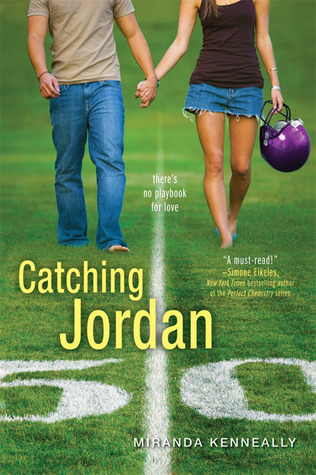 Meet Jordan, high school football captain, quarterback, and… girl. This book is about football the way Friday Night Lights is about football. Yes, it's there, and it's a big part of the characters' lives. But at its core, this book is about one girl standing up for her dreams and tackling any obstacle thrown in her path — sometimes successfully, sometimes not. It's about expectations, family, friendships, love, and a healthy dose of straight-up girl power.
Meet Jordan, high school football captain, quarterback, and… girl. This book is about football the way Friday Night Lights is about football. Yes, it's there, and it's a big part of the characters' lives. But at its core, this book is about one girl standing up for her dreams and tackling any obstacle thrown in her path — sometimes successfully, sometimes not. It's about expectations, family, friendships, love, and a healthy dose of straight-up girl power.
Anyone who's ever questioned her path in life will connect with Jordan's struggles and ultimate triumphs.
Added bonus: Competitive drive that rivals my dad vs. kid Backgammon days, cute football boys, and awesome sexual tension FTW! Also, this book totally reminds me of aforementioned Friday Night Lights, on which I recently got hooked. But I'm only up to season 4, so don't post any spoilers in the comments! (P.S. Heyyyy Tim Riggins! *blushes*). Anyway, yeah. Loved CATCHING JORDAN!
Virtuosity, by Jessica Martinez (October 2011)
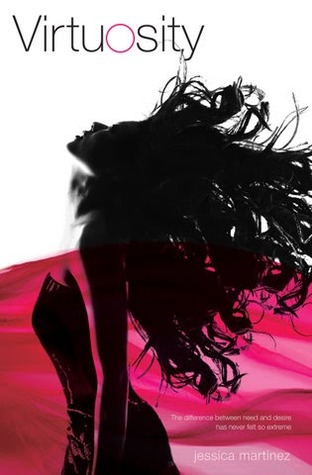 Carmen is a world class, grammy-winning violinist. Despite (and partly because of) her many achievements, Carmen is under constant pressure to be perfect — from the music industry that's come to expect so much from her, from the violin instructor who won't ease up until Carmen gets it just right, and most of all, from her mother, an overbearing force desperate to relive her own stunted music career through her daughter's successes. Carmen's used to doing whatever it takes to win, but as she prepares for the biggest competition of her life, she's starting to unravel, physically and emotionally. Reading this book was like diving down the rabbit hole. I truly felt Carmen's highs and lows, her anguish and fear, her hopes, and I couldn't stop reading until I saw her through to the end.
Carmen is a world class, grammy-winning violinist. Despite (and partly because of) her many achievements, Carmen is under constant pressure to be perfect — from the music industry that's come to expect so much from her, from the violin instructor who won't ease up until Carmen gets it just right, and most of all, from her mother, an overbearing force desperate to relive her own stunted music career through her daughter's successes. Carmen's used to doing whatever it takes to win, but as she prepares for the biggest competition of her life, she's starting to unravel, physically and emotionally. Reading this book was like diving down the rabbit hole. I truly felt Carmen's highs and lows, her anguish and fear, her hopes, and I couldn't stop reading until I saw her through to the end.
Added bonus: I could totally relate to Carmen because I, too, played violin as a teen. Of course, I quit at the start of 9th grade when I decided that carrying around a big black case and practicing every day was just, you know, too much work. But still. Okay, seriously, the musical element of this book was super authentic and cool.
Wintertown, by Stephen Emond (December 2011)
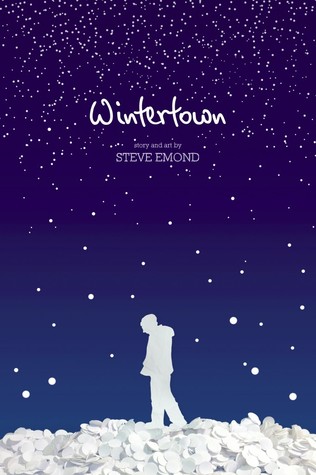 Evan and Lucy are childhood best friends. Ever since Lucy's parents split and she moved to Georgia with her mom, Evan only sees her over winter break. When Lucy shows up this winter, she's completely changed — she's sullen and moody and rockin' a totally new goth style, and Evan just can't get her to open up. As the story unravels, their friendship is severely tested, simultaneously growing closer and breaking apart each time they hang out. I had no idea how things would end — I just knew that I was rooting for them either way. Part graphic novel, part romance, part adventure, WINTERTOWN is the perfect story for a chilly winter's night. It comes out in December, just in time to grab a mug of hot chocolate and curl up under your fave fuzzy blanket (dare I say Snuggie)!
Evan and Lucy are childhood best friends. Ever since Lucy's parents split and she moved to Georgia with her mom, Evan only sees her over winter break. When Lucy shows up this winter, she's completely changed — she's sullen and moody and rockin' a totally new goth style, and Evan just can't get her to open up. As the story unravels, their friendship is severely tested, simultaneously growing closer and breaking apart each time they hang out. I had no idea how things would end — I just knew that I was rooting for them either way. Part graphic novel, part romance, part adventure, WINTERTOWN is the perfect story for a chilly winter's night. It comes out in December, just in time to grab a mug of hot chocolate and curl up under your fave fuzzy blanket (dare I say Snuggie)!
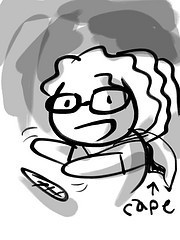 Added bonus: Boy and girl POV, cool book, music, and zombie references throughout, and interesting, authentic adult characters. And also, perhaps most importantly, Mr. Emond is an awesome artist, and he totally cartooned me last year. See right, Sarah as Super Tweeter. I mean, he gave me a cape, you guys!
Added bonus: Boy and girl POV, cool book, music, and zombie references throughout, and interesting, authentic adult characters. And also, perhaps most importantly, Mr. Emond is an awesome artist, and he totally cartooned me last year. See right, Sarah as Super Tweeter. I mean, he gave me a cape, you guys!
Put that in your pipe and… okay, okay. No smoking. Just go over to Goodreads or whatever and add them to your list of cool YA to read this fall and winter. You can also visit Miranda, Jessica, and Stephen online to learn more about them and their work.
Filed under: books, reading








July 26, 2011
Banned, But Never Shamed
I woke up this morning to the news that TWENTY BOY SUMMER, along with Kurt Vonnegut's SLAUGHTERHOUSE FIVE, has been officially banned from the Republic, Missouri school district.
That's right, the crazy train has finally derailed. You all might remember the SpeakLoudly issue from last fall, as it took up lots of blog space here after the book was initially challenged in the district by Wesley Scroggins, a parent whose own kids don't even go to the public school, along with Vonnegut's book and Laurie Halse Anderon's beautiful novel, SPEAK.
Not surprisingly, the whole thing caused a major uproar (particularly among the great citizens of Republic, most of whom find Scroggins' actions as deplorable as I do). But that was just a challenge. Last night, nearly a year after the challenge was issued, after convening committees and discussion groups and who knows what else, the board made their decision. SPEAK stays (thankfully!), but Vonnegut and I are out. You can read the whole article in the News-Leader, but here are a few juicy tidbits:
"We very clearly stayed out of discussion about moral issues. Our discussions from the get-go were age-appropriateness," [Superintendent Vern Minor] said.
Minor also stated:
"Most schools stay away from this and they get on this rampage, the whole book-banning thing, and that's not the issue here. We're looking at it from a curriculum point of view."
Um, okay. Let's just get this on the record right now: Twenty Boy Summer was never part of the curriculum. It was simply available in the school library for students to check out and read on their own time. So clearly, this wasn't about the curriculum.
The article goes on:
Minor said feedback [from the committee] for "Twenty Boy Summer," available in the library, focused on "sensationalizing sexual promiscuity." He said questionable language, drunkenness, lying to parents and a lack of remorse by the characters led to the recommendation.
"I just don't think it's a good book. I don't think it's consistent with these standards and the kind of message that we want to send," he said. "…If the book had ended on a different note, I might have thought differently."
So… just so I'm clear on this (forgive me for not catching on right away — I'm a little slow, since my brain is so addled by the long hard hours it puts in each day devising ways to sensationalize sexual promiscuity and questionable language and whatnot), you're staying out of a discussion about moral issues, yet stating that if the characters in Twenty Boy Summer had been remorseful about sex, language, or lying to parents, then you might have thought differently? That it's not consistent with messages you want to send?
Again, I'm a little fuzzy on how morals work, obviously, since I'm so busy making sure my books influence teens not to have any morals, but… how is that not a moral discussion? How is that not a moral judgment?
Look, I've said it before and I'll say it a million times more. I get that my book isn't appropriate for all teens, and that some parents are opposed to the content. That's fine. Read it and decide for your own family. I wish more parents would do that — get involved in their kids' reading and discuss the issues the books portray. But don't make that decision for everyone else's family by limiting a book's availability and burying the issue under guise of a "curriculum discussion."
But you all know my views on banning books — any books. What I really want to say today is this (close your eyes, Dr. Scroggins, as you'll likely find this content alarming):
Not every teen who has sex or experiments with drinking feels remorseful about it. Not every teen who has sex gets pregnant, gets someone pregnant, or contracts an STD. Not ever teen who has sex does so while in a serious relationship. Not every teen who has sex outside of a relationship feels guilty, shameful, or regretful later on. And you can ban my books from every damn district in the country — I'm still not going to write to send messages or make teens feel guilty because they've made choices that some people want to pretend don't exist.
That's my choice. And I'll never be ashamed of my choice to write about real issues.
You know what, just for Dr. Scroggins, I'm giving away 2 copies of TWENTY BOY SUMMER to random commenters. Happy reading, all. And thanks for speaking loudly!
Filed under: books, reading Tagged: censorship, Slaughterhouse Five, SpeakLoudly, Twenty Boy Summer








June 18, 2011
Colorado Cuteness Report
It's finally summer in Colorado, and after several aww-inducing hikes in the Centennial State, I've come to an important decision: whoever's in charge of giving states their nicknames should totally rename Colorado the Cuteness State. For one thing, "Centennial" is super boring and stuffy. And for another thing — a more important one by far — just look at all this adorableness!
Baby bunny who could fit inside my coffee cup.

This guy was hiding on the side of the path, so small we almost stepped on him. He was seriously about the size of my palm. After nearly blinding him with the flash of a thousand photos, we kindly ushered him off the trail, into the safety of the taller grass. Hours later on the return trek, we found him exposed again, hanging out on the side of the road like some kind of bunny of the night. Kids these days. Honestly! Okay, I'm not sure whether he's actually a bunny or some kind of chipmunk, but still. He should not be out on the road like that!
Bewildered prairie dog who took a wrong turn at Albuquerque.

Poor thing was all, "WTF is that?! WATER! Where the hell am I?!" He spent a few more minutes darting out toward the waves and back before taking off into the woods, probably to reboot his GPS.
We saw both of those furballs at Chatfield State Park last week. We also saw coyote and fox on the Highline Canal trail (they're admittedly less cuddly). Yesterday, we hit up Roxborough State Park for a hike in the rain. I didn't have my camera, and for most of the afternoon, the only wildlife we saw was a caterpillar hanging out on a leaf, which was totally fine by me, because Roxborough is Rattlesnake Country (yes, there are signs so naming it), among other things, and I prefer to keep my poisonous wildlife, my larger-than-a-bicycle wildlife, my teeth-sharper-than-a-razor wildlife, and my shit-that-can-just-mow-me-down-and-eff-me-up wildlife at least fifty feet away at all times. Little personal policy right there.
Unfortunately Pet Monster doesn't have the same policy. He's like one animal mimicry away from a trip to the emergency room. Near the end of our Roxborough hike, he started making eyes at a mule deer in the meadow, who then followed us onto the path as if we had food. Or possibly were food. Or maybe she just wanted to be friends. Now, I like a cute mule deer as much as the next girl, but not when she's following me instead of skittering off like a normal deer ought to. So I got a little jumpy and begged Pet Monster to keep his eyes on the trail ahead of us, walk fast, and stop encouraging the thing.
Death-by-mule-deer narrowly averted, we marched onward, only for PM to make a new friend.
Pet Monster: Look up there — something's moving on the ridge.
Me: Ohmygod, is that a mountain lion?
PM: Um, no.
Me: I seriously think it's a mountain lion. And look! It's moving toward us!
PM: *Squints at the thing because it's like 5 million miles away* No, it's not.
Me: He's coming this way! He's totally stalking us! We have to go RIGHT NOW! *tugs desperately on PM's arm*
PM: He doesn't even know we're here. Why are you so freaked out?
Me: Excuse me, but I really don't want to get killed. Getting eaten by a mountain lion right now would be so… lame!
PM: You're not going to be eaten by a mountain lion.
Me: Well I don't want to get bit by one, either. Or tasted, licked, or sniffed. You know what? I don't even wanna be looked at by a mountain lion. *speedwalks down the trail*
PM: That was a mule deer, just so you know.
I guess it's fitting that as soon as we got back to the car, the final wildlife sighting — waiting for us beneath a nearby truck — was a Stellar's Jay, which is this really cool blue-and-gray bird that totally sounds like he's laughing at you.
So maybe the Cuteness State isn't the best name for Colorado. How about the Cute From A Safe Distance and/or Looking Out The Car Window State?
Filed under: adventures and trips








June 16, 2011
The Writing Life: Research is Hard
[image error]
Actual conversation of great import between me and my husband (a.k.a. Pet Monster) today:
Me: I'm doing research for my new book.
Pet Monster: Cool.
Me: Yeah. So… um… if you happen to notice me looking at any strange websites, or you accidentally find a folder on my computer with a few and/or a lot of pictures of smoldering, shirtless boys, it's totally for… you know.
Pet Monster: *raises eyebrow* Totally for…?
Me: *makes air quotes* Research purposes.
Pet Monster: *blinks*
Me: It's just that I'm trying to figure out what my new boys look like. There are at least two of them in this book — maybe more — and I totally need visual aids. Like, a lot of them.
Pet Monster: *blinks*
Me: *crosses arms* It's not that easy, you know, looking up pictures of shirtless hotties. Every time I search for "cute teen boys," I end up on some Justin Bieber fansite. And possibly an FBI watchlist.
Pet Monster: So, what are we doing for dinner?
Yeah. I don't know why he keeps me around, either. But there you have it, friends. A day in the life of a professional writer. And by "professional," I clearly mean "unprofessional."
Photo credit: I don't know who took the original photo, but I found it here. I believe the model's name is Niels Erik Toren, which translates from the Dutch to Hottie Without Shirt.
Filed under: writing








June 6, 2011
All This Darkness! What to Buy The Grownup Reader? (A Parody)
Contemporary fiction for grownups is exploding with explicit abuse, violence, depravity, scandal, lies, casual sex, crime, conspiracy, oneupmanship, financial ruin, loose morals, overt glorification of generally bad ideas, and boobs.
Why is no one talking about this?
I recently stood slack-jawed in the adult fiction section of my local big box book store, having decided that supporting my community while getting personalized recommendations by professionals who generally adore books and make it their business to know exactly what sorts of things a reader will adore was just not on my to-do list this year, feeling stupefied and helpless.
I was searching for a gift for a grownup friend (at the risk of sounding tokenistic, some of my best friends are grownups and I have a great relationship with "the grownups" as a whole), but at every turn, my poor and tired eyes were met with red-and-black covers with proclamations in huge typeface that scream IMPENDING DOOM. The titles alone gave me instant nightmares: BURIED PREY? SIXKILL? THE FINAL STORM? THOSE IN PERIL? It was all, like, conspiracy and apocalypse and vampires, murder and incest, thinly veiled racism that seriously undercuts our upstanding moral code as a nation — especially when it comes to the impressionable sensibilities of our country's adult population.
I was astonished and more than a little appalled, frankly, that adult fiction had gotten so dark. How dark, you ask? Well, as a person who doesn't actually read adult fiction, and doesn't remember what it was like to be an adult, and in fact categorically looks down on adults as out of touch and unable to think a single original thought without their mass media drip feed, I'm obviously very highly qualified to answer this question: adult fic is so dark, why, just writing this blog post about the darkness requires a sun lamp, a clove ciggie, and a bottle of chilled Bombay Sapphire, lest I become apathetic and socially disengaged by all the dark-mongering and partake in some totally grownup coping mechanism like, IDK… spawning an illegitimate child with my housekeeper, tweeting pictures of my crotch and lying about it and then not lying about it, sexually assaulting a hotel staff person, shooting at people with an AK-47, deciding that forced sexual intercourse isn't actually rape if the woman said no but didn't physically fight back, taking away health benefits for the really old people, causing the collapse of the free market economy, or any of the other "that's sooo grownup" activities I've read about in today's news. It's so dark that in a single book, let's call it Martin's GAME OF THRONES, the first few chapters alone cover the alarmingly black topics of incest, rape, slavery, beheading, something with magic wolves, dragon eggs, forced marriage, poisoning, and native women dressed in all-too-revealing animal skins, every curve described in such excruciatingly vivid detail that the book may as well be called GAME OF BOOBS.
If books are a lens unto the world, the adult section at my local big box bookstore is a magnifying glass unto the ass of the ant of decency, people. Obviously not every book aimed at tender-minded grownups is pure evil, but for the careless old reader, or one who actively seeks out licentiousness and vice (yes, those rare tainted souls certainly exist in the world of grownups, much as we'd like to stick our heads in the sand and pretend otherwise!), the path to the wicked world of horrendous literary indecency and exalted iniquity is a mere swipe of the overextended debit card away.
I mean, look at Cormac McCarthy's THE ROAD. Total effing downer, man! Books like that are why people like Harold Camping ring the doomsday bells every few years. He probably picked up that story looking for a fun armchair travel read, or perhaps hoping for a movie-still of Viggo Mortensen's naked ass (who hasn't! That movie was called Eastern Promises, though, FYI), getting instead a bleak tale of violence and cannibalism, roving gangs of rapists and murderers, death and mayhem and utter hopelessness on every page. Rapture? Don't bother. Might as well just off yourself after reading something like that, bud.
Speaking of gratuitously morally bankrupt books made into movies, have you read Dan Brown's bestselling THE DAVINCI CODE? He practically accuses Holy Mother Mary of cashing in her V-card. Talk about blasphemy! And what's up with this Sookie Stackhouse person, anyway? Come on, Charlaine Harris! Don't you know that grownups are feeble-minded, easily spooked, and downright impressionable? You think you can just write about vampires and sex and sex with vampires and not impact — dare I say, shatter — the entirely too delicate worldview of adults?
I realize these authors believe they're validating the grownup experience, giving comfort and succor and a real voice to an otherwise subverted, subjugated, sublevel subgroup. But hasn't anyone considered the obvious fact that such stories, rather than validating a terrible yet ultimately rare experience, in fact normalize a collective thirst for blood, no pun intended? Feed the flames of sickness and immorality? Infect the weak-minded with negativity and self-loathing? Give otherwise good, well-meaning grownups some really bad ideas, the consequences of which the soft folds of their brains simply can't comprehend?
Honestly, folks, let's call this complete lack of censorship and mind control what it is: lazy, lackadaisical, inexcusable buck-passing in an era where none of us wants to claim any responsibility for ensuring that our adult population survives this difficult transition. You've all heard the rhetoric: it's not our job to raise other people's parents — their own kids should do it! Their bosses and teachers should do it! CNN should do it!
No, friends. I'm afraid it's down to us. For if not we — the wise and knowing and all-presumptuous — who will take a stand against authors and publishers and booksellers who insist on filling the heads of old people with filth, flarn, and smut? Who will save the lives of those endearing yet ultimately etiolated adults who learn how to commit rape in books like BASTARD OUT OF CAROLINA or how to fake a nervous breakdown after devouring THE BELL JAR? What if they read the original, unedited version of THE ADVENTURES OF HUCKLEBERRY FINN and learn the dreaded n-word? What if Kerouac's ON THE ROAD inspires them on a road-tripping, poetry-writing, substance-abusing bender?
If it's true what the experts at the Wall Street Journal (that bastion of journalistic integrity and forward-thinking) say, "Entertainment does not merely gratify taste, after all, but creates it," then frankly, I'm concerned for our future as a people. Because if authors and publishers and booksellers don't stop shoving misery and depravity down grownups' tender pink gullets — if they can't come up with more appealing, relevant, and appropriately non-dark works of substance for the adult reader — if they can't write and sell stories that stop encouraging rampant extramarital fornication, brutal criminal acts, the rape of our natural resources by corporate giants run by hapless adults, and the near-complete and utter effing-over of society by a bunch of grownups in suits who obviously learned the how-tos and justifications of bad behavior from novels glorifying such debauchery and turpitude — the adult reader, and those slack-jawed gift-givers like myself, will be forced to make the most immoral, appalling, and dangerous choice of all: to shop in the YA section.
Let's all pour a little out for the collective loss of innocence, shall we?
*Takes another swig of Sapphire.*
*Spits on the floor*
Note: this article is a parody of the stupidness going on over here: Darkness Too Visible, by Meghan Cox Gurdon
Filed under: Book Publishing 101, books, publishing, reading Tagged: Darkness, Gurdon, YA fiction








May 15, 2011
Brown & Caletti: NYT Book Review Misses the Point (Again)
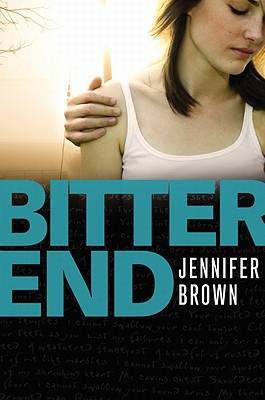 This weekend's Sunday Book Review featured two of my favorite YA authors: Jennifer Brown and her new release, BITTER END, and Deb Caletti and her latest, STAY. Both novels deal with abusive relationships—a brutally tough subject to tackle in fiction, especially in fiction for teens.
This weekend's Sunday Book Review featured two of my favorite YA authors: Jennifer Brown and her new release, BITTER END, and Deb Caletti and her latest, STAY. Both novels deal with abusive relationships—a brutally tough subject to tackle in fiction, especially in fiction for teens.
Stories like Brown's and Caletti's are important, and I'm thrilled to see the books covered by the New York Times. But the article, Novels About Abusive Relationships by Lisa Belkin, goes off the rails right in opening line:
The purpose of young adult literature is often twofold: to tell a story, and to send a message, usually in the form of a much-needed lesson.
Cringing yet?
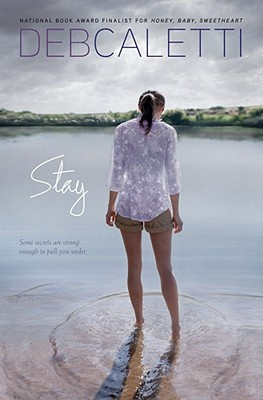 This broad categorization of YA as Establisher of Morals and Teacher of Wayward Youth (there should totally be a cape and a catchphrase, right?) is as outmoded as my Sony Walkman (no offense to those of you still rockin' cassettes, but…). As soon as I read that opening line, I knew Belkin would miss the point of Brown and Caletti's books and any YA titles she chooses to review.
This broad categorization of YA as Establisher of Morals and Teacher of Wayward Youth (there should totally be a cape and a catchphrase, right?) is as outmoded as my Sony Walkman (no offense to those of you still rockin' cassettes, but…). As soon as I read that opening line, I knew Belkin would miss the point of Brown and Caletti's books and any YA titles she chooses to review.
Why?
She just doesn't get it.
Like I tell my students in our YA novel workshop, the purpose of young adult fiction is singular: to tell a story. Period. Learning lessons and adjusting moral compasses might be an outcome of the reading, but that's entirely up to the reader. If it's going to happen it all, it will happen organically as she's experiencing the journey of the story along with the characters. Of course authors should care about their subject matter, and should always write with something important to say. Call that an underlying message of you'd like, but much as the "do as I say, not as I do" lectures from parents, the moment a novel is crafted with the specific intent to send messages or teach lessons, the audience tunes out.
Belkin assumes:
When today's parents were themselves young adults, they were reading books about adolescents but written for grown-ups ("The Bell Jar," "I Know Why the Caged Bird Sings," "Go Ask Alice"). The books their children are reading, though, don't even pretend to appeal to grown-ups — which is, of course, part of their appeal.
This is just another example of a grown-up—one who doesn't understand or like YA fiction—dismissing the entire category as trite, unimportant, non-literature (*cough* Julie Just and the Parent Problem, anyone? *cough*). Belkin misses the mark here, too. YA doesn't have to pretend—lots of it does appeal to grown-ups. It's one of the reasons the category turns a profit year after year despite all the gloom-and-doom news from the publishing industry: teens aren't the only ones buying up (and devouring) those books.
Belkin wraps it up with these thoughts about BITTER END and STAY:
Moreover, the need to tell a good story gets in the way of the message… Any girl who needs guidance navigating a threatening relationship will probably not find it here. But this assumes teenagers are more interested in morals than in sex and drama…
The need to tell a good story trumps all else in fiction. And in music, art, dance, photography, poetry, and arguably any creative expression. We create to share stories and make real human connections to universal truths and experiences, not to teach finger-wagging lessons. Sex and drama? Yes, please. More, please. That's part of real life. Ask a teen if she's interested in reading morals and lessons or real life stuff, what do you think she'll say?
(Hint: If you're still pondering the answer, you might want to reacquaint yourself with teen culture by snagging a few YA books on tape for your Sony Walkman.)
When it comes girls who need help navigating an abusive relationship—or sex, sexuality, parental divorce, grief and loss, peer pressure, drugs and alcohol, mental illness, eating disorders, falling in love, friend betrayals, or any number of real life challenges teens face every day—I encourage Ms. Belkin to resist the urge to assume she knows where they'll find guidance. Like any novel—YA, adult, or otherwise—STAY and BITTER END won't be right for every reader. Some won't like the characters, or they won't connect to the story, or the writing styles won't appeal to their individual palettes. But one of those stories might be the very thing someone reads before she finally understands she's not alone. It might help her deal with her issues and get out of danger.
It might save her life.
That's why it kills me when adults who don't even try to understand YA so casually dismiss these stories, blaming their own inability to relate to, connect with, and appreciate the narrative not on personal reader taste or issues with the construction of the story, but on so-called "pitfalls of the genre."
Pitfalls of the genre? More like pitfalls of adulthood, particularly when adults don't remember what it's like to be a teen. I'm all for debate and critical reviews, especially when those reviews are thoughtful and engaging. What I'm not for is unilaterally dismissing YA novels based on ridiculous and outdated expectations of what young adult literature is supposed to be or do. Every novel is unique, and each deserves to be read and reviewed for its individual storytelling merit, not for its ability to spin the "proper" cautionary tale.
Filed under: books, reading








May 12, 2011
Dessen in Denver!
Just got back from dinner following an awesome event at Tattered Cover in Highlands Ranch with Sarah Dessen, on tour for her latest, WHAT HAPPENED TO GOODBYE!
You all know about my Dessen-love from the early days, right? Well, in case you're new around here, let me tell you, because it's pretty simple.
She's the reason I write YA. Without her books, TWENTY BOY SUMMER and FIXING DELILAH wouldn't exist.
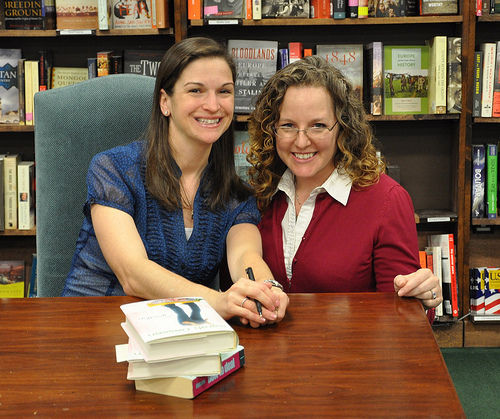 No, really. Her books THAT SUMMER and SOMEONE LIKE YOU, which were combined in the movie tie-in edition called HOW TO DEAL, were my first YA reads as an adult (because at the time, I was like, hey, two books for the price of one, with Mandy Moore on the cover? Sweet!), soon followed by Laurie Halse Anderson's SPEAK and Deb Caletti's THE QUEEN OF EVERYTHING. After that, I knew I was born to write for teens. These lovely ladies are like my trifecta of fangrildom, and now I can honestly say that I've appropriately (or maybe inappropriately) fangirled all three in person. All that and I got to eat something called "adult mac-n-cheese" for dinner and bring home a whole container of chocolate chip brownies from my friend Meredith. Now I'll spend the next two days reading Sarah's WHAT HAPPENED TO GOODBYE, turing pages while alternately jamming brownies into my mouth.
No, really. Her books THAT SUMMER and SOMEONE LIKE YOU, which were combined in the movie tie-in edition called HOW TO DEAL, were my first YA reads as an adult (because at the time, I was like, hey, two books for the price of one, with Mandy Moore on the cover? Sweet!), soon followed by Laurie Halse Anderson's SPEAK and Deb Caletti's THE QUEEN OF EVERYTHING. After that, I knew I was born to write for teens. These lovely ladies are like my trifecta of fangrildom, and now I can honestly say that I've appropriately (or maybe inappropriately) fangirled all three in person. All that and I got to eat something called "adult mac-n-cheese" for dinner and bring home a whole container of chocolate chip brownies from my friend Meredith. Now I'll spend the next two days reading Sarah's WHAT HAPPENED TO GOODBYE, turing pages while alternately jamming brownies into my mouth.
Do you realize what this means? That even if the world ends next Saturday like all those crazies keep saying, I can go out with a smile and a sigh, because my life will be complete.
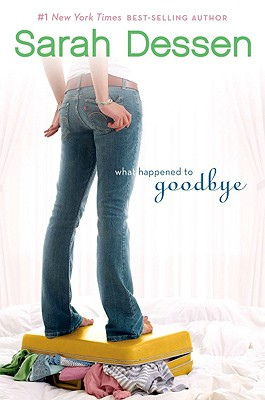 How can your life be so complete, you ask? Well, I can't send you brownies, but tonight I snagged an extra autographed copy of WHAT HAPPENED TO GOODBYE for one lucky reader!
How can your life be so complete, you ask? Well, I can't send you brownies, but tonight I snagged an extra autographed copy of WHAT HAPPENED TO GOODBYE for one lucky reader!
To enter for a chance to win, leave a comment here and tell us about a time you had to leave without saying goodbye. Take it as literally or as figuratively as you'd like — maybe you had to rush home after a party, or you got into a fight and stormed out, or you forgot. Or maybe you found yourself at a new place or a new part of your life and realized you never really let the old part go. Or maybe you ate the last brownie only didn't know it was the last brownie, and your spouse was all, "I can't believe you didn't save me any brownies!" and you were all, "What? I didn't even get a chance to say goodbye to that last brownie, and now they're gone!" Not saying that the last one's a true story or anything… just for illustrative purposes… *anyway*
Enter your comments below for a chance to win, and if you tweet, blog, or Facebook about the giveaway, mention that in your comments and I'll give you an extra entry. Fine print: autographed book does not come with brownies. I can probably add some brownied fingerprints though, if you ask nicely. 
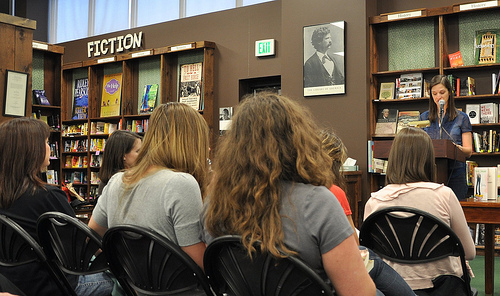
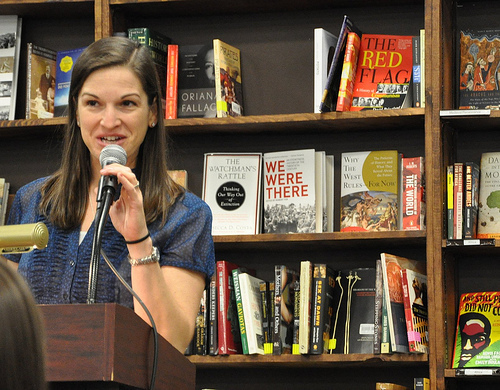
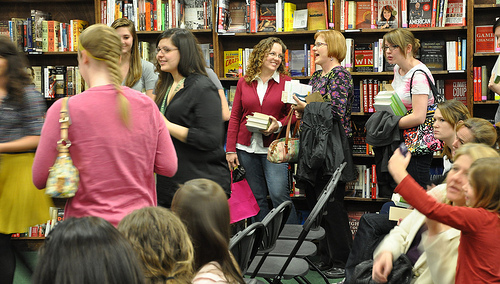
Thanks again to Sarah Dessen for being so gracious in the face of my nervous and possibly borderline stalkerish babbling, and thanks as always to Jinx, Mickey, and the wonderful staff at Tattered Cover who make reading and writing in Denver so impossibly great.
Filed under: books, contests, events, reading











